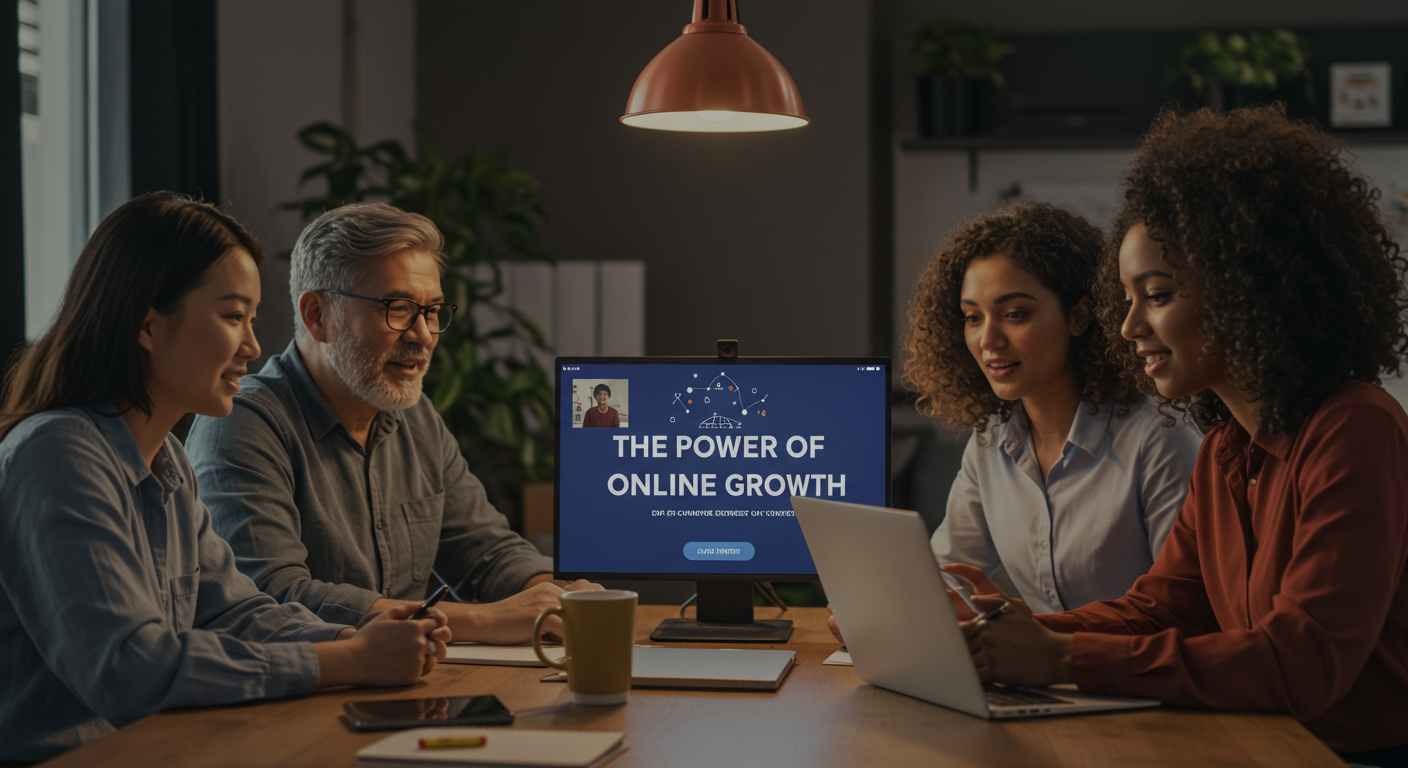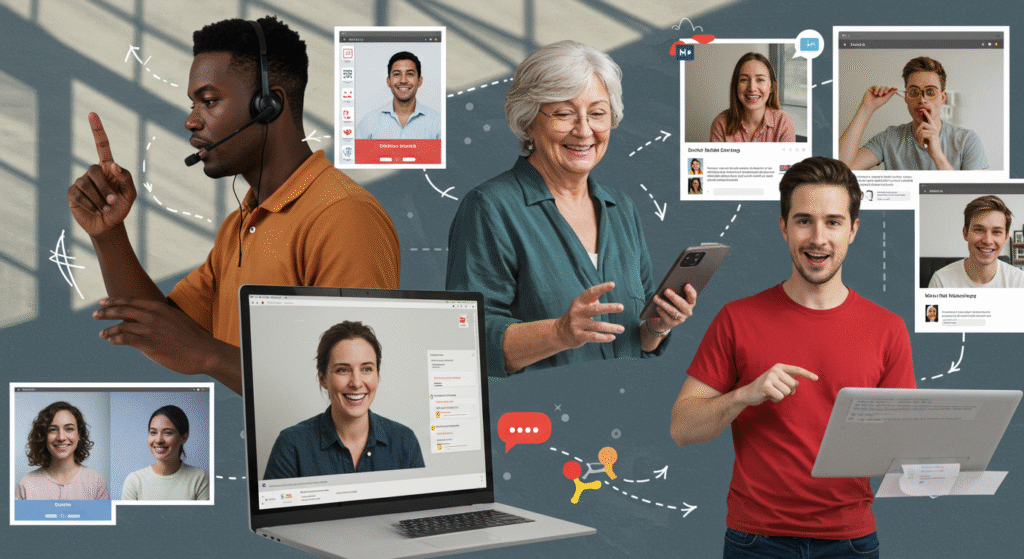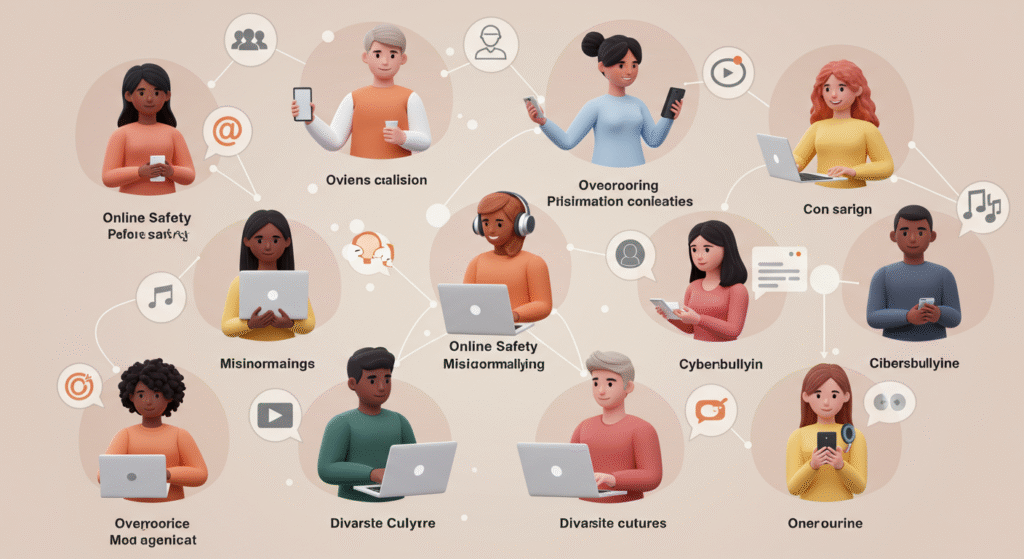Table of Contents
- Introduction: The Rise of Online Growth Communities
- The Psychology of Belonging in Digital Spaces
- How Online Communities Influence Mindset
- Boosting Motivation Through Shared Accountability
- Confidence Building in Growth-Focused Circles
- Learning & Skill Development in Online Forums and Courses
- Comparing Online vs. Offline Growth Communities (Table)
- Case Study: A Personal Transformation Through Digital Community
- Best Practices for Thriving in Growth Communities
- Overcoming Challenges in Online Communities
- The Future of Online Growth Communities
- Conclusion & Final Thought
- FAQs
1. Introduction: The Rise of Online Growth Communities
In recent years, online growth communities have exploded in popularity as more people seek digital spaces for connection, personal growth, and self-improvement.
These communities exist in many forms—social media groups, forums, coaching programs, mastermind groups, and online courses. Each space provides unique opportunities for learning and support. Unlike traditional self-help methods, online growth communities thrive on interactivity.
Members are not passive consumers; they actively contribute knowledge, share experiences, and support one another.
This co-creation process transforms communities into thriving ecosystems where everyone benefits. People who once felt isolated in their personal development journey now have access to a network of like-minded peers across the globe.
Key Points:
- Online communities expand access to mentors and peers worldwide.
- They create belonging, accountability, and inspiration.
- Members co-create value instead of just consuming content.
- Digital platforms enable faster knowledge-sharing.
- Communities provide motivation through peer energy.
- Growth accelerates when support is collective.
2. The Psychology of Belonging in Digital Spaces
Belonging is one of the deepest human needs, tied to motivation, resilience, and emotional well-being. Online growth communities provide a modern solution to isolation by allowing individuals to connect with like-minded people regardless of geography.
This digital belonging fosters a sense of being valued and understood. Members feel encouraged to share vulnerable experiences and take bold steps in personal growth because they know they will not face judgment.
The encouragement from peers acts as a powerful motivator and directly contributes to emotional resilience. Belonging doesn’t just make people feel good—it strengthens confidence and unlocks potential.
Key Points:
- Belonging is essential for mental health and motivation.
- Online groups reduce loneliness and isolation.
- Validation and encouragement fuel growth.
- Communities dissolve geographical and cultural barriers.
- Peer-to-peer support increases resilience.
- Belonging fosters risk-taking and goal-setting.
3. How Online Communities Influence Mindset
Mindset—the lens through which we view challenges and opportunities—can be transformed through online growth communities.
By engaging with stories of perseverance, success, and failure, members start reshaping their inner narratives. When someone sees a peer overcoming procrastination or achieving a career breakthrough, it sparks the belief that they can do the same.
Mindsets shift gradually, reinforced by discussions, workshops, and shared affirmations. Over time, limiting beliefs weaken, optimism grows stronger, and resilience becomes natural.
A strong growth mindset doesn’t just appear—it is cultivated, and communities are the fertile ground for this cultivation.
Key Points:
- Success stories inspire transformation.
- Shared wisdom accelerates learning.
- Limiting beliefs are replaced with empowering perspectives.
- Resilience grows through consistent reinforcement.
- Community language shifts self-talk.
- Positive peer modeling drives mindset evolution.
4. Boosting Motivation Through Shared Accountability
Motivation often fades when pursued alone, but shared accountability keeps the fire burning.
Online growth communities provide accountability structures—progress check-ins, challenges, and group discussions—that encourage consistency.
Members are more likely to follow through when they know others are watching their progress. This sense of responsibility to the group transforms motivation from a short-lived burst into long-term momentum.
Celebrating wins together, no matter how small, fosters a culture of encouragement. When setbacks happen, encouragement from peers helps members bounce back quickly.
Key Points:
- Accountability partners increase follow-through.
- Shared goals reduce procrastination.
- Progress check-ins reinforce discipline.
- Celebrating wins builds community morale.
- Group support turns resistance into action.
- Motivation evolves into sustainable habits.
5. Confidence Building in Growth-Focused Circles
Confidence is not built in isolation; it thrives in environments of support and encouragement. Online growth communities provide safe spaces where individuals can share achievements, fears, and goals without judgment.
Validation from peers fosters self-belief, while witnessing others’ achievements provides social proof that success is possible.
Many communities also offer opportunities for leadership and mentorship, which further strengthen confidence.
Over time, this newfound confidence transcends the digital space and impacts personal, professional, and social aspects of life.
Key Points:
- Supportive environments encourage vulnerability.
- Peer validation builds lasting self-belief.
- Social proof from others boosts courage.
- Leadership opportunities grow confidence.
- Mentorship nurtures empowerment.
- Confidence transfers into real-life situations.
6. Learning & Skill Development in Online Forums and Courses
While motivation and mindset are crucial, learning practical skills is another pillar of online growth communities.
Digital spaces such as forums, mastermind groups, and online courses combine structured learning with peer support.
Members benefit from resource-sharing, peer feedback, and collective problem-solving. Unlike traditional classrooms, these communities allow personalized, flexible learning.
Accountability ensures knowledge isn’t just consumed but applied in real-world contexts. This blend of education and community interaction makes skill development more sustainable and enjoyable.
Key Points:
- Communities blend learning with accountability.
- Peer knowledge exchange accelerates growth.
- Members share resources and tools freely.
- Constructive feedback sharpens skills.
- Flexible formats suit different learning styles.
- Skills are reinforced by real-world application.
7. Comparing Online vs. Offline Growth Communities (Table)
| Aspect | Online Communities | Offline Communities |
|---|---|---|
| Accessibility | Global, 24/7 access | Limited to local availability |
| Cost | Often low-cost or free | Can be expensive (venues, memberships) |
| Diversity | Wide cultural and professional diversity | Limited diversity |
| Learning Opportunities | Courses, forums, webinars, masterminds | In-person workshops, seminars |
| Flexibility | Self-paced, virtual interactions | Fixed schedules and locations |
| Support System | Instant global peer support | Stronger local, face-to-face bonding |
8. Case Study: A Personal Transformation Through Digital Community
Meet Sarah, a young professional who struggled with procrastination and self-doubt. She joined an online community dedicated to productivity and personal growth.
At first, Sarah felt nervous about sharing her struggles, but the group’s encouragement gave her courage. She participated in weekly accountability check-ins, where she shared small wins.
Over time, she reframed limiting beliefs, developed consistent habits, and built self-confidence. Within six months, Sarah launched her dream project and transitioned into a career she once believed was out of reach.
Her transformation was not driven by willpower alone but fueled by collective accountability and sha
9.Best Practices for Thriving in Growth Communities
- Be consistent in your participation.
- Offer help, not just seek it.
- Set clear goals before joining.
- Use accountability partnerships.
- Share and celebrate your wins.
- Balance learning with application.
- Stay open to diverse perspectives.
- Avoid comparison traps.
- Document your journey for reflection.
- Contribute value to strengthen trust.
10. Overcoming Challenges in Online Communities
Despite their many benefits, online growth communities are not free from challenges. Digital fatigue and information overload are common pitfalls.
Members may feel overwhelmed by constant notifications or pressured to keep up with others. Setting boundaries and choosing communities that align with your values are key to avoiding burnout.
Intentional engagement is more impactful than passive scrolling. Instead of joining multiple groups, focus on a few high-quality ones. By practicing discernment, individuals can maximize benefits while minimizing drawbacks.
Key Points:
- Digital fatigue is a major risk.
- Boundaries protect mental energy.
- Value alignment ensures connection.
- Intentional engagement matters more than volume.
- Quality over quantity increases impact.
- Healthy habits prevent burnout.
11. The Future of Online Growth Communities
Technology is shaping the next era of online growth communities. Virtual reality, artificial intelligence, and personalized learning journeys are transforming the way people connect and grow.
Imagine attending a virtual mastermind in a 3D environment or using AI to design a tailored growth roadmap. These innovations will deepen immersion and make growth communities even more powerful.
As access expands globally, diverse voices will enrich conversations, and opportunities for collaboration will multiply. The future of personal growth lies in blending human connection with digital innovation.
Key Points:
- VR will bring immersive experiences.
- AI will personalize growth journeys.
- Hybrid formats will blend online and offline.
- Global access will enrich diversity.
- Technology will enhance accountability tools.
- Collaboration will grow exponentially.
12. Conclusion & Final Thought
Online growth communities are reshaping the way we approach self-improvement. They provide more than just connection; they offer accountability, motivation, learning, and confidence-building.
By engaging intentionally, individuals can accelerate transformation that impacts every aspect of life. The best part? Growth communities are accessible to anyone with internet access.
If you’ve been looking for support in your personal growth journey, the digital world is ready to welcome you. The future of growth is digital—and the best time to start is now.
13. FAQs
Q1. What are online growth communities?
A: Digital groups that provide support, resources, and accountability for personal growth.
Q2. Are online communities as effective as in-person groups?
A: Yes. Online groups offer flexibility and diversity, while in-person groups provide deeper bonding.
Q3. How do these communities build confidence?
A: Through validation, safe sharing, mentorship, and observing others succeed.
Q4. Can I find mentorship online?
A: Many communities encourage mentorship through peer and expert connections.
Q5. What role does accountability play?
A: It keeps members consistent, motivated, and less likely to quit.
Q6. Are they free?
A: Many are free or low-cost; premium options provide structured resources.
Q7. How do I choose the right community?
A: Look for alignment with your values, goals, and preferred interaction style.
Q8. What risks should I be aware of?
A: Digital fatigue, information overload, and superficial connections.
Q9. Can online friendships become real?
A: Yes. Many people form lifelong friendships that start digitally.
Q10. How do communities impact mindset long-term?
A: They reframe self-talk, build resilience, and create lasting positive habits.









